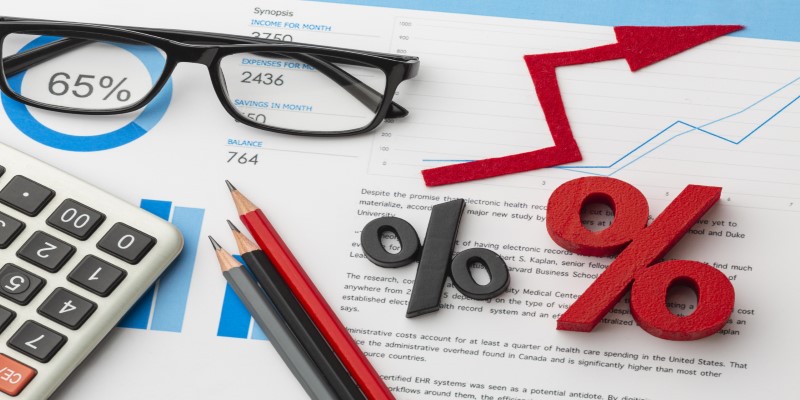The Surprising Ways Credit Card Debt Can Mess with Your Tax Refund
Nov 30, 2023 By Triston Martin
You've probably heard the saying, "Nothing is certain except death and taxes." While it's true that taxes are a part of life, what might surprise you is that credit card debt can also play a role in this equation. In this simplified guide, we'll delve into the ways credit card debt can affect your tax return. So, grab your favorite beverage, and let's unravel this financial mystery together.
How Credit Card Debt and Taxes Are Connected
To understand how credit card debt and taxes are intertwined, let's break it down into bite-sized pieces. First, it's essential to realize that credit card debt, unlike other forms of debt, such as mortgages or student loans, is considered unsecured debt. Unsecured debt means that there's no collateral tied to it. You didn't promise to hand over your car or house if you can't pay your credit card bill.
Now, here's where taxes come into play. When you have unsecured debt, like credit card balances, and you're unable to pay it off, it can lead to certain consequences, including potential impacts on your tax return. Here are some ways credit card debt can affect your taxes:
Interest Deductions

One of the most notable ways credit card debts can influence your taxes is through interest deductions. Generally, the interest you pay on credit card debt is not tax-deductible. Unlike mortgage interest or student loan interest, which may provide tax benefits, credit card interest payments won't reduce your taxable income.
Pro tip: To minimize credit card interest, pay off your balances as soon as possible.
Bankruptcy and Tax Implications
If you find yourself in a dire financial situation and decide to file for bankruptcy, it can have significant consequences for your tax return. Certain types of bankruptcy can discharge credit card debt, but the discharge may be considered taxable income. This means you might owe taxes on the forgiven debt, which can affect your overall tax liability.
Note: Consult with a tax professional if you're considering bankruptcy to understand its potential tax implications.
Collection Efforts and Liens
When you're unable to pay your credit card debt, the credit card company may take collection actions against you. These efforts can include hiring collection agencies or even taking you to court. If a court judgment is issued and you're unable to pay, it can result in a tax lien on your property. A tax line can hinder your ability to sell or refinance your assets, and it may also affect your credit score.
Credit Card Debt and Tax refunds
Now that we've explored how credit card debt and taxes are connected, let's talk specifically about how your tax refund might be affected:
Offset of Tax Refund
If you owe money to the federal or state government due to unpaid taxes, child support, or other federal debts, they can seize part or all of your tax refund through a process called a tax refund offset. However, credit card debt itself won't lead to a direct offset of your tax refund.
Use of Tax Refund to Pay Down Debt
While credit card debt doesn't directly lead to a tax refund offset, you can still choose to use your tax refund to pay down your credit card balances. It's a smart financial move, as reducing your debt can save you money on future interest payments and improve your overall financial health.
Pro tip: Allocate a portion of your tax refund to pay off high-interest credit card debt.
Claiming Tax credits
On the flip side, if you're eligible for tax credits like the Earned Income Tax Credit (EITC) or Child Tax Credit, receiving a tax refund can provide financial relief and help you address your credit card debt. These credits can increase the amount of your tax refund, giving you extra funds to put toward your debt.
Strategies to Manage Credit Card Debt Effectively
Now that you understand how credit card debt can impact your tax return, let's discuss some strategies to manage it effectively:

Create a Budget: Start by assessing your income, expenses, and credit card balances. Create a realistic budget that allocates a portion of your income to paying down your credit card debt. Stick to this budget diligently to make consistent progress.
Prioritize High-Interest Debt: If you possess multiple credit cards, focus on settling the one that carries the highest interest rate as your top priority. This strategy will ultimately help you reduce your long-term interest expenses and save money.
Consider Debt Consolidation: Debt consolidation involves taking out a loan or opening a new credit card with a lower interest rate to pay off your existing credit card balances. This can make managing your debt more manageable, but be cautious not to accumulate new debt on the consolidated card.
Seek Professional Help: If you find yourself grappling with excessive credit card debt, it may be helpful to seek advice from a credit counselor or a debt management agency. They can offer support and help you create a plan for repaying your debt.
Avoid Late Payments: Paying your bills late not only incurs expensive late charges but also has an adverse effect on your credit rating. Ensure timely payments to uphold or enhance your creditworthiness.
Conclusion
In summary, credit card debt can indeed affect your tax return in various ways, primarily through interest deductions and potential tax implications of bankruptcy. However, it's important to note that credit card debt itself won't lead to a direct offset of your tax refund.
To navigate this financial landscape wisely, create a budget, prioritize high-interest debt, and consider debt consolidation if it suits your situation. Seek professional help if needed, and always aim to make timely payments to improve your financial well-being. Remember, by taking control of your credit card debt, you can minimize its impact on your tax return and secure a healthier financial future.








